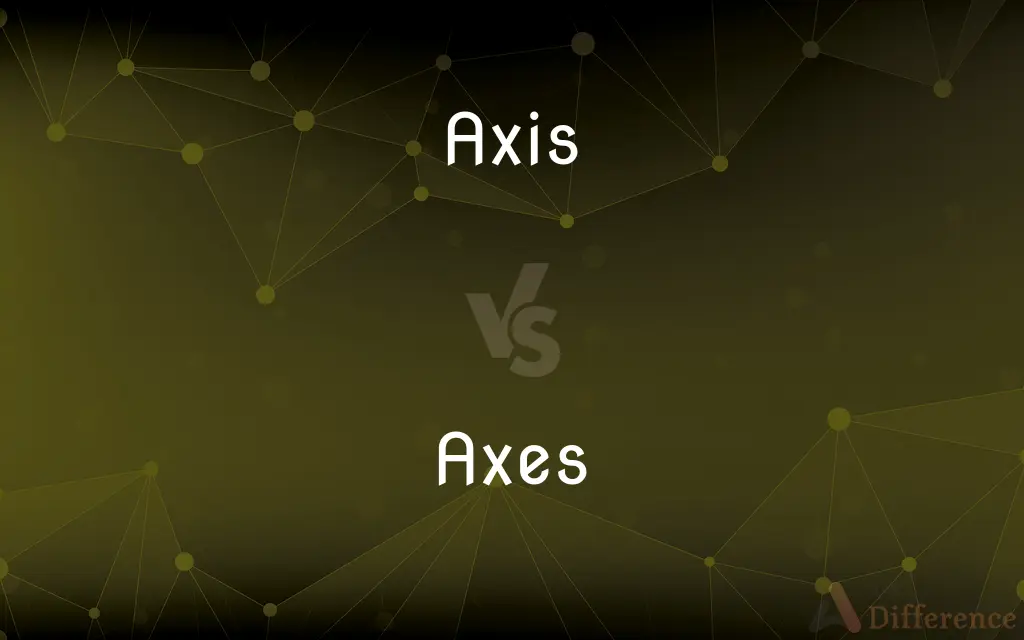Axis vs. Axes — What's the Difference?
By Tayyaba Rehman — Updated on October 6, 2023
Axis refers to an imaginary line around which something rotates or is symmetrically arranged. "Axes" is both the plural of "axis" and the plural of "axe," a tool with a blade.

Difference Between Axis and Axes
Table of Contents
ADVERTISEMENT
Key Differences
The term Axis denotes a central or main structure about which something turns or is organized. It's a conceptual or physical line. Axes, on the other hand, has a dual meaning; it can mean multiple central lines or refer to multiple cutting tools.
When discussing geometry or rotation, an Axis serves as the reference point. For instance, Earth rotates about its axis. In this context, if referring to more than one, the term Axes is appropriate, indicating multiple reference points.
Separately, Axes is the plural form of "axe," a tool typically used for chopping wood. Here, Axis doesn't fit into the context at all, as it holds an entirely different meaning from "axe."
A significant point to understand is the context in which each term is used. When you hear Axis, it's commonly in reference to rotation or organization. With Axes, it's crucial to discern if the conversation is about tools or multiple rotation points.
Summarily, while Axis and Axes sound similar, their meanings can be vastly different. One concerns central lines, and the other could mean either multiple such lines or several bladed tools, based on context.
ADVERTISEMENT
Comparison Chart
Definition
A line about which something rotates
Plural of axis or plural of axe
Context
Rotational, organizational
Rotational or tool-based
Singular/Plural
Singular
Plural
Part of Speech
Noun
Noun
Example Usage
Earth's axis
The axes of a graph or The firefighter carried two axes.
Compare with Definitions
Axis
A central or principal structure.
The spinal column is the axis of the human body.
Axes
Principal lines in a graph or chart.
The axes on the chart were clearly labeled.
Axis
A main route or line of movement.
The city's main axis is congested during rush hours.
Axes
Main lines or routes.
The main axes of the city are lined with shops and cafes.
Axis
A straight line about which a body or geometric object rotates or may be conceived to rotate.
Axes
Plural form referring to multiple central or principal structures.
The axes of the two wheels were perfectly aligned.
Axis
An unlimited line, half-line, or line segment serving to orient a space or a geometric object, especially a line about which the object is symmetric.
Axes
Variant of axe.
Axis
A reference line from which distances or angles are measured in a coordinate system.
Axes
Plural of axis.
Axis
A center line to which parts of a structure or body may be referred.
Axes
A tool with a bladed, usually heavy head mounted crosswise on a handle, used for felling trees or chopping wood.
Axis
An imaginary line to which elements of a work of art, such as a picture, are referred for measurement or symmetry.
Axes
Any of various bladed, handheld implements used as a cutting tool or weapon.
Axis
The second cervical vertebra on which the head turns.
Axes
(Informal) A sudden termination of employment
My colleague got the axe yesterday.
Axis
Any of various central structures, such as the spinal column, or standard abstract lines used as a positional referent.
Axes
(Slang) A musical instrument, especially a guitar.
Axis
(Botany) The main stem or central part about which organs or plant parts such as branches are arranged.
Axes
Plural of axe.
Axis
One of three mutually perpendicular lines that define the orientation of an aircraft, with one being along its direction of travel and the other two being perpendicular to the direction of travel.
Axes
A straight line about which a body or geometric object rotates or may be conceived to rotate.
Axis
A line through the optical center of a lens that is perpendicular to both its surfaces.
Axes
An unlimited line, half-line, or line segment serving to orient a space or a geometric object, especially a line about which the object is symmetric.
Axis
One of three or four imaginary lines used to define the faces of a crystal and the position of its atoms.
Axes
A reference line from which distances or angles are measured in a coordinate system.
Axis
An alliance of powers, such as nations, to promote mutual interests and policies.
Axes
A center line to which parts of a structure or body may be referred.
Axis
Axis The alliance of Germany and Italy in 1936, later including Japan and other nations, that opposed the Allies in World War II.
Axes
An imaginary line to which elements of a work of art, such as a picture, are referred for measurement or symmetry.
Axis
(geometry) An imaginary line around which an object spins (an axis of rotation) or is symmetrically arranged (an axis of symmetry).
The Earth rotates once a day on its axis
Axes
The second cervical vertebra on which the head turns.
Axis
(mathematics) A fixed one-dimensional figure, such as a line or arc, with an origin and orientation and such that its points are in one-to-one correspondence with a set of numbers; an axis forms part of the basis of a space or is used to position and locate data in a graph (a coordinate axis)
Axes
Any of various central structures, such as the spinal column, or standard abstract lines used as a positional referent.
Axis
(skeleton) The second cervical vertebra of the spine
Axes
(Botany) The main stem or central part about which organs or plant parts such as branches are arranged.
Axis
(anatomy) An imaginary, visualized plane separating two morphologically similar parts of an organism
Axes
One of three mutually perpendicular lines that define the orientation of an aircraft, with one being along its direction of travel and the other two being perpendicular to the direction of travel.
Axis
(psychiatry) A form of classification and descriptions of mental disorders or disabilities used in manuals such as the DSM (Diagnostic and Statistical Manual of Mental Disorders)
Axes
A line through the optical center of a lens that is perpendicular to both its surfaces.
Axis
(botany) The main stem or central part about which organs or plant parts such as branches are arranged
Axes
One of three or four imaginary lines used to define the faces of a crystal and the position of its atoms.
Axis
(military) An alliance or coalition.
Axes
An alliance of powers, such as nations, to promote mutual interests and policies.
Axis
A deer native to Asia, of species Axis axis.
Axes
Axis The alliance of Germany and Italy in 1936, later including Japan and other nations, that opposed the Allies in World War II.
Axis
The spotted deer (Cervus axis or Axis maculata) of India, where it is called hog deer and parrah (Moorish name).
Axes
To chop or fell with or as if with an axe
Axed down the saplings.
Axed out a foothold in the ice.
Axis
A straight line, real or imaginary, passing through a body, on which it revolves, or may be supposed to revolve; a line passing through a body or system around which the parts are symmetrically arranged.
Axes
(Informal) To remove ruthlessly or suddenly
A social program that was axed to effectuate budget cuts.
Axis
A straight line with respect to which the different parts of a magnitude are symmetrically arranged; as, the axis of a cylinder, i. e., the axis of a cone, that is, the straight line joining the vertex and the center of the base; the axis of a circle, any straight line passing through the center.
Axes
Variant of ask.
Axis
The stem; the central part, or longitudinal support, on which organs or parts are arranged; the central line of any body.
Axes
Plural of ax
Axis
The second vertebra of the neck, or vertebra dentata.
Axes
Plural of axe
Axis
One of several imaginary lines, assumed in describing the position of the planes by which a crystal is bounded.
Axes
All etymologies and senses
Axis
The primary or secondary central line of any design.
Axes
All etymologies and senses
Axis
A straight line through a body or figure that satisfies certain conditions
Axes
Plural form of an imaginary line about which a body or geometric figure rotates.
The x, y, and z axes define three-dimensional space.
Axis
The center around which something rotates
Axes
The plural form of a tool with a heavy bladed head mounted across a handle.
He sharpened his axes before going to chop the firewood.
Axis
The main stem or central part about which plant organs or plant parts such as branches are arranged
Axis
In World War II the alliance of Germany and Italy in 1936 which later included Japan and other nations;
The Axis opposed the Allies in World War II
Axis
A group of countries in special alliance
Axis
The 2nd cervical vertebra; serves as a pivot for turning the head
Axis
An imaginary straight line about which a body or geometric figure rotates.
The Earth spins on its axis.
Axis
A reference line for the measurement of coordinates.
The horizontal axis on a graph represents time.
Axis
An agreement or alliance between two or more countries.
The Axis powers of World War II included Germany, Italy, and Japan.
Common Curiosities
What does "Axis" mean in geometry?
In geometry, "Axis" refers to a straight line about which a body or figure rotates.
What does "Axis" refer to in history?
Historically, the "Axis" refers to the alliance of Germany, Italy, and Japan during World War II.
How do you differentiate between "Axes" meaning multiple "axis" and the tool?
Context is crucial. If the discussion is about rotation or graphs, it's about "axis." If it's about cutting or chopping, it's the tool.
Is "Axes" the plural form of "Axis"?
Yes, "Axes" can be the plural form of "Axis."
How do you pronounce "Axes"?
"Axes" is pronounced like "AK-seez."
Can "Axes" also refer to tools?
Yes, "Axes" is also the plural form of "axe," a tool with a bladed head.
Can "Axes" refer to routes or pathways?
Yes, "Axes" can mean principal lines or routes.
Can a graph have multiple Axes?
Yes, for instance, a 3D graph has x, y, and z axes.
Why is the Earth's axis important?
The Earth's axis, and its tilt, is responsible for the changing seasons.
Do all geometrical figures have an Axis?
Not all, but many geometric figures have an axis or axes of symmetry.
Are Axes always straight?
As tools, axe designs can vary. As lines or reference points, axes are typically straight.
Is "Axis" always related to rotation?
No, "Axis" can also mean a central structure or a principal line, not always implying rotation.
Are "Axes" always sharp?
No, axes as tools can be blunt, but they're often sharpened for efficient cutting.
What does "Axis" mean in anatomy?
In anatomy, "Axis" can refer to the second cervical vertebra upon which the head rotates.
In which contexts is "Axis" most commonly used?
"Axis" is commonly used in geometry, geography, history, and anatomy, among others.
Share Your Discovery

Previous Comparison
Trustee vs. Agent
Next Comparison
Pikey vs. GypsyAuthor Spotlight
Written by
Tayyaba RehmanTayyaba Rehman is a distinguished writer, currently serving as a primary contributor to askdifference.com. As a researcher in semantics and etymology, Tayyaba's passion for the complexity of languages and their distinctions has found a perfect home on the platform. Tayyaba delves into the intricacies of language, distinguishing between commonly confused words and phrases, thereby providing clarity for readers worldwide.















































